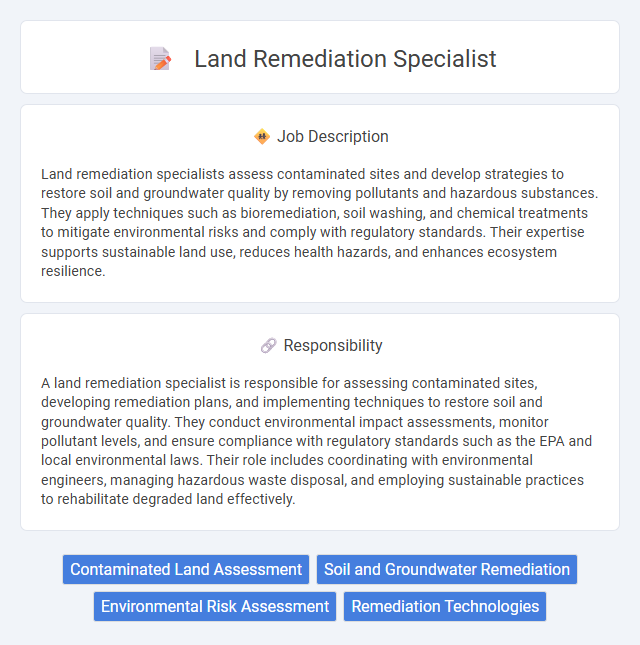
Land remediation specialists assess contaminated sites and develop strategies to restore soil and groundwater quality by removing pollutants and hazardous substances. They apply techniques such as bioremediation, soil washing, and chemical treatments to mitigate environmental risks and comply with regulatory standards. Their expertise supports sustainable land use, reduces health hazards, and enhances ecosystem resilience.
Individuals who demonstrate strong problem-solving skills and a passion for environmental science are likely suitable for a career as a land remediation specialist. Those comfortable with fieldwork, data analysis, and physical labor may find the job fulfilling, while people who prefer purely office-based roles or lack resilience for potentially hazardous conditions might struggle to adapt. It is probable that candidates with a background in environmental studies, chemistry, or engineering, coupled with attention to detail, will excel in this profession.
Qualification
A Land Remediation Specialist must possess a degree in environmental science, engineering, or geology combined with certifications such as Certified Hazardous Materials Manager (CHMM) or Registered Environmental Manager (REM). Proficiency in soil and groundwater contamination assessment, risk analysis, and remediation technologies is essential. Experience with regulatory frameworks like EPA standards and knowledge of environmental impact assessments enhance qualification strength.
Responsibility
A land remediation specialist is responsible for assessing contaminated sites, developing remediation plans, and implementing techniques to restore soil and groundwater quality. They conduct environmental impact assessments, monitor pollutant levels, and ensure compliance with regulatory standards such as the EPA and local environmental laws. Their role includes coordinating with environmental engineers, managing hazardous waste disposal, and employing sustainable practices to rehabilitate degraded land effectively.
Benefit
A land remediation specialist likely improves environmental quality by restoring contaminated sites, which can enhance public health and increase property values. Their expertise may attract regulations compliance and reduce legal risks for businesses or governments. Employers might also benefit from cost savings due to efficient cleanup processes and sustainable land reuse.
Challenge
Land remediation specialists likely face the challenge of addressing complex environmental contamination that requires thorough site assessments and tailored cleanup strategies. They may need to navigate regulatory requirements and unpredictable site conditions, which can complicate project timelines and budgets. Adapting to emerging technologies and contaminated materials probably adds another layer of difficulty to their work.
Career Advancement
Land remediation specialists gain career advancement by developing expertise in soil contamination assessment, risk management, and environmental regulations. Mastery in cutting-edge remediation technologies and project management enhances their value, leading to leadership roles or consultancy opportunities. Continuous certification and specialized training in sustainability practices further propel career growth in environmental and engineering firms.
Key Terms
Contaminated Land Assessment
Land remediation specialists play a crucial role in contaminated land assessment by identifying pollutants, evaluating soil and groundwater conditions, and determining the extent of contamination. They utilize advanced techniques such as soil sampling, risk analysis, and geospatial data to develop effective cleanup and management plans. Expertise in environmental regulations ensures assessments comply with legal standards, safeguarding public health and ecosystem integrity.
Soil and Groundwater Remediation
Land remediation specialists focus on soil and groundwater remediation to mitigate environmental contamination and restore ecosystems. They utilize advanced techniques such as bioremediation, chemical oxidation, and soil vapor extraction to remove pollutants like hydrocarbons, heavy metals, and volatile organic compounds. These professionals conduct site assessments, develop remediation plans, and monitor treatment effectiveness to ensure compliance with environmental regulations and public health standards.
Environmental Risk Assessment
Environmental Risk Assessment is a critical responsibility for a Land Remediation Specialist, involving the identification, evaluation, and management of potential contaminants affecting soil, water, and air quality. Leveraging advanced analytical techniques and industry standards, the specialist designs and implements remediation strategies to mitigate adverse environmental impacts and ensure regulatory compliance. Expertise in risk characterization, exposure pathways, and toxicity assessment enables effective decision-making to restore contaminated sites and protect public health.
Remediation Technologies
Land remediation specialists apply advanced remediation technologies such as bioremediation, soil vapor extraction, and chemical oxidation to restore contaminated sites efficiently. Expertise in in-situ and ex-situ techniques ensures effective removal of pollutants from soil and groundwater, enhancing environmental health and regulatory compliance. Mastery of remediation technologies supports sustainable land reuse and minimizes ecological impact during site clean-up projects.
 kuljobs.com
kuljobs.com